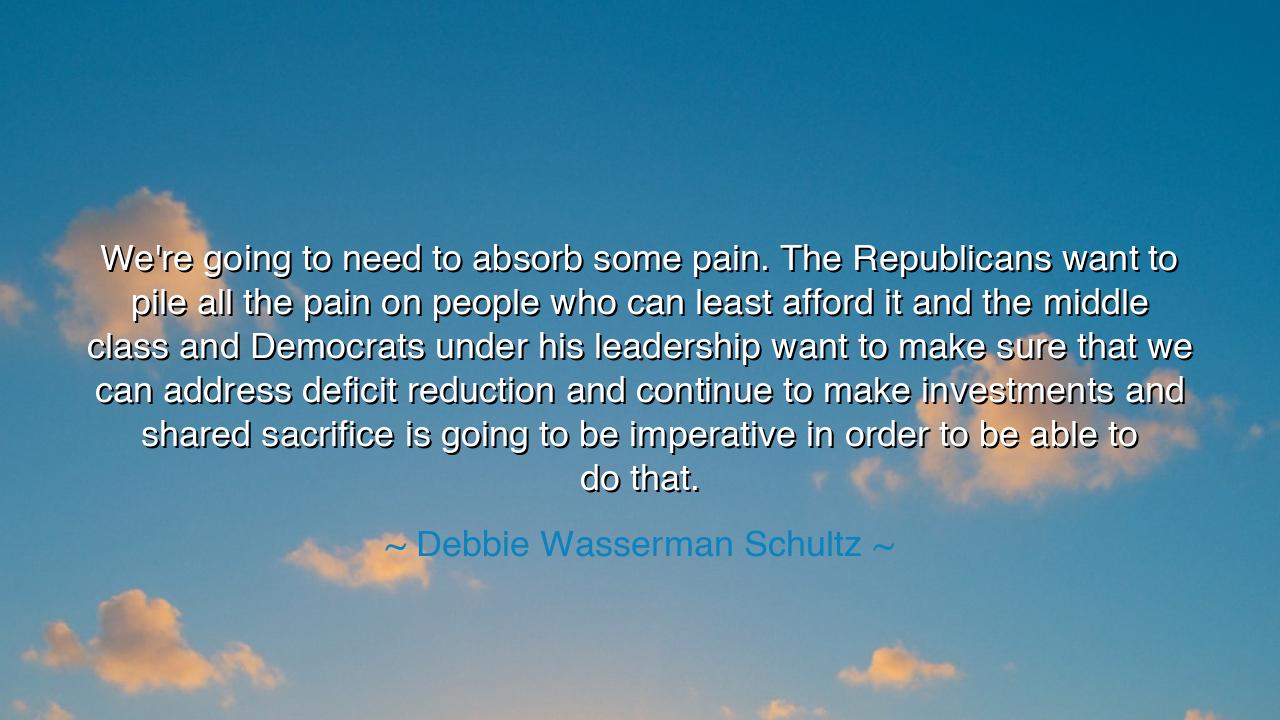
We're going to need to absorb some pain. The Republicans want to
We're going to need to absorb some pain. The Republicans want to pile all the pain on people who can least afford it and the middle class and Democrats under his leadership want to make sure that we can address deficit reduction and continue to make investments and shared sacrifice is going to be imperative in order to be able to do that.






The words of Debbie Wasserman Schultz—“We’re going to need to absorb some pain. The Republicans want to pile all the pain on people who can least afford it and the middle class, and Democrats under his leadership want to make sure that we can address deficit reduction and continue to make investments, and shared sacrifice is going to be imperative in order to be able to do that”—speak to an ancient truth that echoes through the rise and fall of civilizations: that progress demands sacrifice, and that justice lies not in avoiding hardship, but in distributing it with fairness and wisdom. Her words are the lament of one who has seen the burden of suffering laid unequally upon the people, and who calls for balance—a sacred balance between austerity and compassion, between duty and care.
When she speaks of the need to absorb some pain, she reminds us that no nation, no family, no soul grows without struggle. Pain is the teacher of endurance, the crucible that refines resolve. Yet, her warning is equally clear—when the powerful seek to heap all hardship upon the weak, society itself begins to rot from within. For a nation is not sustained by its wealth alone, but by the shared spirit of its people, and when that spirit is broken by inequality, the walls of prosperity crumble like ancient stone.
This truth was understood by the wise rulers of old. In the days of Pericles, when Athens faced the ruin of war, he urged his citizens not to forsake their duty to rebuild, reminding them that the glory of the city belonged to all, not merely to those who profited from peace. In the same spirit, Franklin D. Roosevelt, amid the storms of the Great Depression, spoke to the American people of “shared sacrifice,” asking the rich and the poor alike to give something of themselves so that the nation might endure together. History shows that when sacrifice is shared, it becomes noble—but when it is imposed upon the powerless, it becomes tyranny in disguise.
Wasserman Schultz’s plea for shared sacrifice is not only political—it is moral. It is a call to remember that society is a covenant between generations, not a contract of convenience. To “address deficit reduction” is not merely an economic task; it is an act of stewardship, a promise to the unborn that we will not spend their future for our present ease. Yet, to do so while “continuing to make investments” in people—education, health, and opportunity—is what elevates sacrifice from suffering to purpose. It is the difference between destruction and renewal.
There is a rhythm to her words, a recognition that pain is inevitable, but injustice is not. In every era, those in power face the temptation to protect their comfort while others bleed. But the leaders who endure in memory—the Lincolns, the Churchills, the Roosevelts—are those who bore the pain alongside their people, who spoke not from the safety of privilege but from the shared fire of struggle. True leadership does not escape hardship; it absorbs it, transforming pain into strength, and loss into legacy.
The image of the middle class in her words stands as the heart of the people, the pulse of the nation. When that heart is crushed under the weight of inequity, the whole body falters. A society that asks too much of its laborers, its families, its teachers, while protecting the few from discomfort, walks the same doomed path as Rome before its fall—decaying not from invasion, but from within, when compassion gave way to greed.
From this reflection, a great lesson emerges: pain must have purpose, and sacrifice must have balance. We cannot avoid the trials that life or history bring, but we can choose how to bear them—together, or apart. Let every citizen, every leader, every teacher remember that the strength of a people lies not in their wealth, but in their willingness to lift one another through the storm.
And so, as the ancients would say, let us not fear pain, but honor it—as the price of unity, the path to growth, and the proof of our shared humanity. For in the crucible of shared sacrifice, a nation finds not only its endurance, but its soul.






AAdministratorAdministrator
Welcome, honored guests. Please leave a comment, we will respond soon